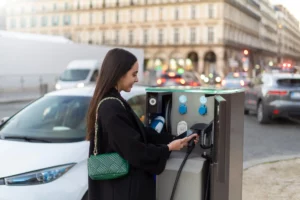
Home / EV Charging News / Electric Cars and the Sharing Economy
In recent years, the rise of the sharing economy has had a profound impact on the way people think about ownership. Instead of owning possessions, people are increasingly interested in sharing and renting items. One area where this trend is particularly noticeable is in the use of electric cars. In this article, we will explore how the sharing economy is driving the growth of electric car usage and changing the way people think about car ownership.
Electric cars have been around for over a century, but it is only in recent years that they have become a serious contender to the traditional gasoline-powered car. This is due in part to advances in technology, which have made electric cars more reliable and affordable. But it is also due to the changing attitudes of consumers, who are increasingly concerned about the environment and the impact of fossil fuels on the planet.
The sharing economy has played a significant role in the growth of electric car usage. Car sharing services like Zipcar, Car2Go, and Getaround have made it easier than ever for people to use electric cars without having to own them. These services allow people to rent electric cars by the hour or day, giving them access to a vehicle when they need it without the hassle of owning one.
In addition to car sharing services, there are also ride-hailing services like Uber and Lyft that are encouraging the use of electric cars. Both Uber and Lyft have made commitments to move towards a fleet of electric vehicles, and are offering incentives to drivers who switch to electric cars.
There are many benefits to using electric car sharing services. For one, it is more environmentally friendly than owning a car. According to a study by the University of California, Berkeley, car sharing can reduce greenhouse gas emissions by up to 54 percent compared to car ownership.
In addition to the environmental benefits, electric car sharing is also more cost-effective than owning a car. This is because car owners have to pay for the upfront cost of the car, as well as maintenance, insurance, and other associated costs. With car sharing services, these costs are spread out among many users, making it cheaper for everyone.
The future of electric cars and the sharing economy looks bright. As more people become aware of the benefits of electric car sharing, we can expect to see a continued increase in the number of electric cars on the road. This, in turn, will help to reduce greenhouse gas emissions and improve air quality.
However, there are still some challenges to overcome. One of the biggest challenges is the infrastructure needed to support electric cars. This includes charging stations, which are currently not widely available in many areas.
Despite these challenges, the sharing economy is driving the growth of electric car usage and changing the way people think about car ownership. As we move towards a more sustainable future, electric cars and the sharing economy will continue to play an important role in shaping the way we live and work.
Governments around the world are recognizing the benefits of electric car sharing and are taking steps to support its growth. In some cities, governments are investing in charging infrastructure to make it easier for electric cars to be shared. Others are offering incentives to encourage people to use electric cars, such as tax credits, rebates, and discounted parking.
In addition, some cities are implementing regulations to encourage the use of electric car sharing services. For example, some cities are requiring new buildings to include electric car charging stations, while others are offering preferential parking spots for electric car sharing vehicles.
The rise of electric car sharing has had a significant impact on the way people think about car ownership. Many people are now realizing that owning a car is not necessary, especially if they live in a city where public transportation and car sharing services are readily available.
This shift in thinking is leading to a decline in car ownership, which is good news for the environment. According to a report by the Rocky Mountain Institute, car sharing services could reduce car ownership by up to 80 percent in some urban areas.
Electric cars and the sharing economy are two trends that are transforming the way we think about transportation. By making electric cars more accessible through sharing services, we are reducing our reliance on fossil fuels and helping to create a more sustainable future.
As we move towards a future where car ownership is less common, we can expect to see more investment in electric car sharing services and charging infrastructure. This, in turn, will help to accelerate the growth of electric car usage and reduce the negative impact of transportation on our planet.
